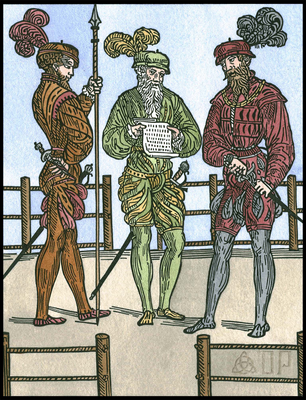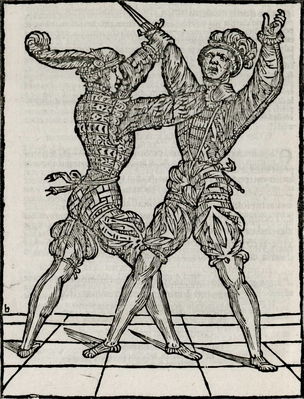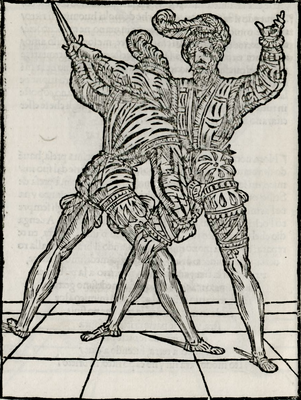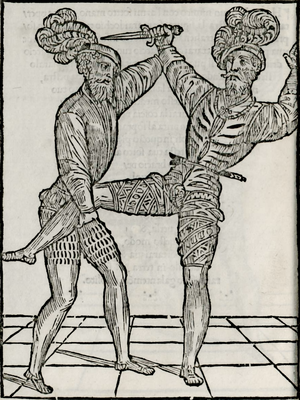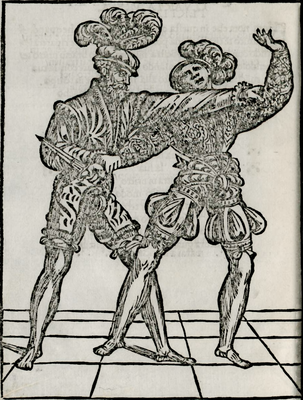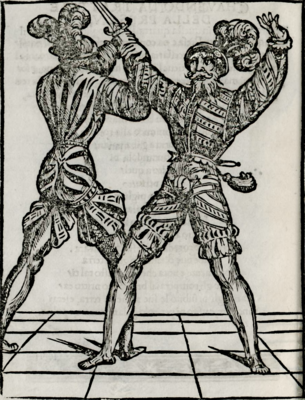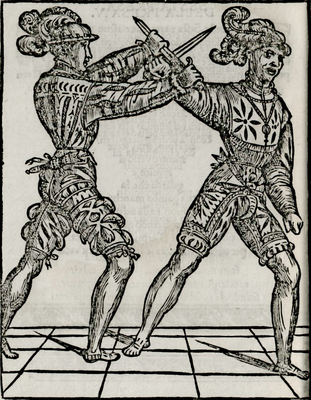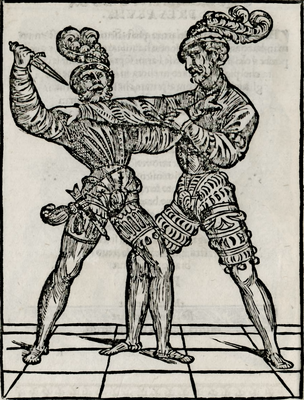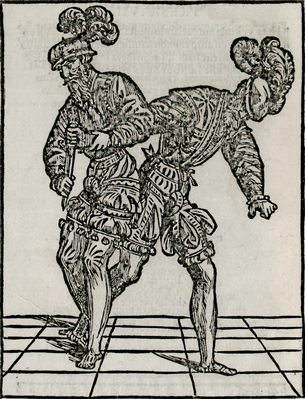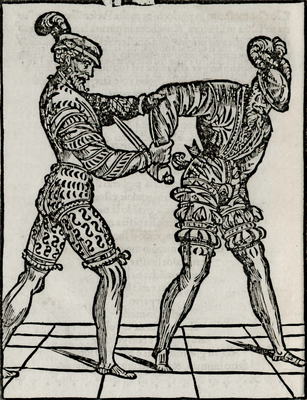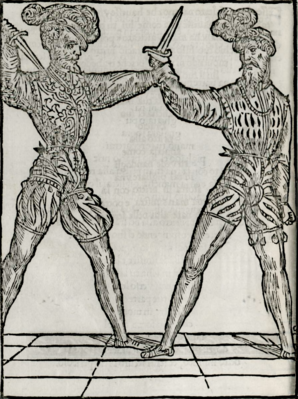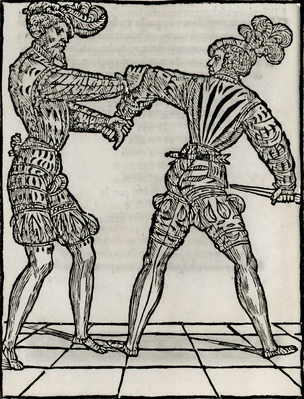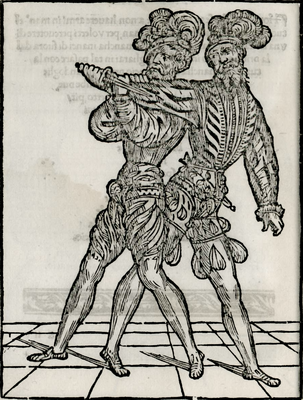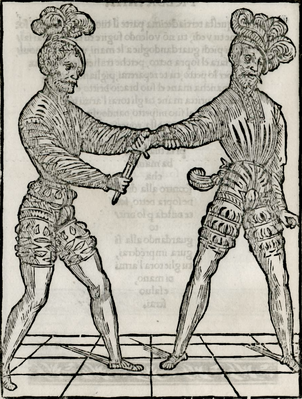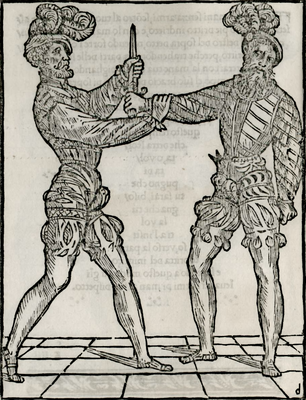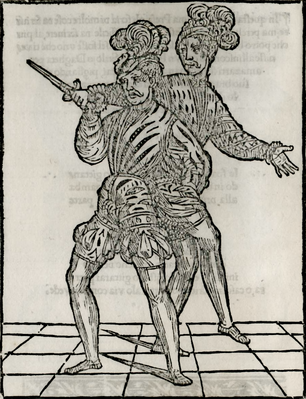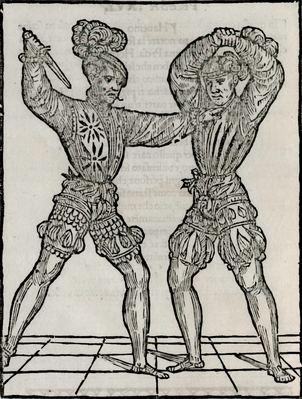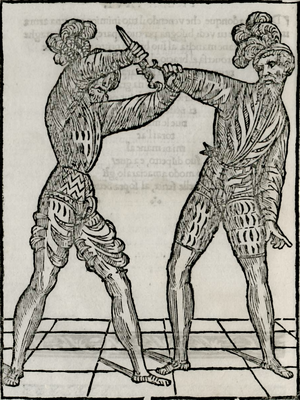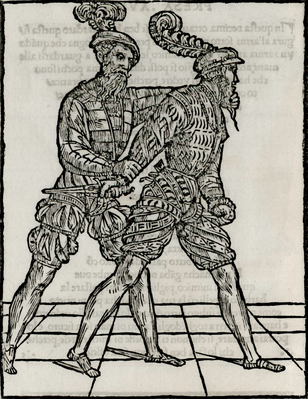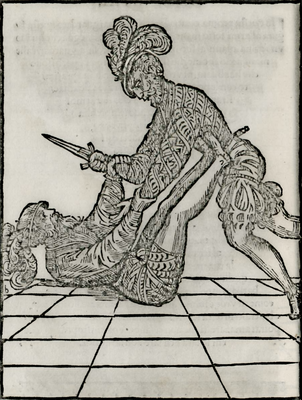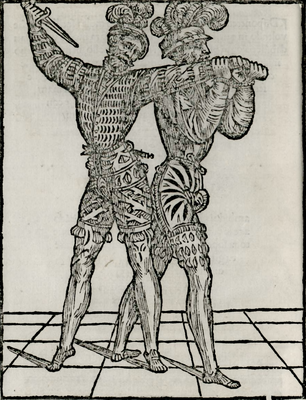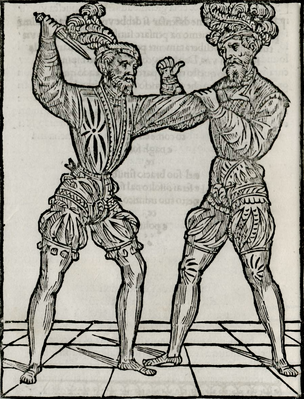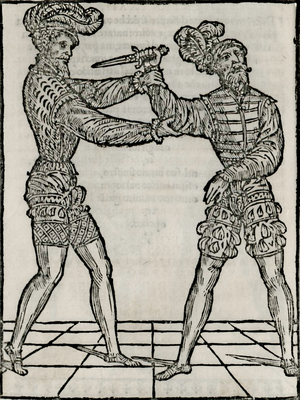|
|
You are not currently logged in. Are you accessing the unsecure (http) portal? Click here to switch to the secure portal. |
Achille Marozzo/Fifth Book
Images |
Transcription | |
|---|---|---|
| BOOK 5
The following is the fifth book of the occurring cases in single battle, which the armiger knights will do, whether from examples of antiquity & authority of consulting our great law or our most serene Emperors or our other predecessors if they will govern as well as the constitution of arms, consulted with deliberation by very experienced combatants, with approval of ancient martial fighters, if they will guide us, not discounting the faithful history by truthful and approved authors. |
LIBRO QUINTO
Seguita il quinto libro de gli occorrenti casi nelle singulari battaglie, che gli armigeri cavalieri faranno, se da antiqui exempli & autorità de eximii juris consulti o serenissimi Imperatori o altri predecessori nostri se governaranno e se per constitutione d’armi, consultata deliberatione de espertissimi combattenti, con aprobatione de’ vetusti martiali, se reggeranno, non postergando le fideli historie di veridichi & approbati autori. | |
| Chapters 186 to 266 are a direct copy of select chapters from the 1476 dueling treatise of the famous legal expert Paride del Pozzo, and will appear on that page. The remainder of book 5 follows: | ||
| Cap. 267. Di uno che fosse stato dipinto, se con ragione si può refutare di combattere.
Uno che sia stato dipinto risponde e dice, se bene è stato dipinto & che lui sia mancato a quel che paresse essere tenuto, questo è stato sol per non combattere il torto e non per viltà; ma questo è stato sol per ricognoscere Iddio summa verità favoreggiante de la giustitia, come chiaramente è noto, ma al presente conosce haver ragione, la quale gli ha data il suo adversario & intende restaurare l’honor suo et far fama; et quando fusse stato per chiaro giudicio di refutarlo, non sta bene sotto tal colore di darli causa di combattere; responderemo per lo adversario e diremo che la causa procede da la forma et che una causa causa l’altra, però non accetta esser stato lo principio, ma è stato meggio et ch’el fine se relassa; perchè non si conviene lo Agnello col Lupo, nè il Lepro con l’Orso, nè il Coniglio col Leone et non il magnanimo con il codardo, nè manco possi fare d’una cosa morta una viva et darli vita, nè manco possi fare che una donna meretrice sia vergine, sì ch’el buon trionfo canta, esclamma genti di ferro e di valore armata e che l’ha poco l’uno e manco l’altro. Concludendo dico non può provare e non convien che de militia splende mal consueto; e questo vivere è bene attendere et in quello riposarsi. | ||
| Cap. 268. Del contrasto delli armigeri contra li letterati.
Quivi responderemo contra li letterati: dico che li armigeri sono espurgatori de’ peccati, destrugitori de lor superbie, reveditori de lor persuasioni & lor idolare; & tal vitij di crudeltà non regnano da’ virili magnanimi, solum contra inimici, la qual legge Imperiale non vieta ch’el nimico se dannifica in qualsivoglia modo; in quanto al vero, la necessità non ha legge in alcun tempo & quando non si esercita il mestiero se vive honoratamente con i suoi quartieri o paghe e denari de’ grandi, standosi a piacere li veneno & fanno buona ciera, viveno nobili, perchè sono denari de nobili & non son tenuti se non da servire nobili; ma i letterati viveno di denari de mendichi & poveri & quelli sono obligati servire a forza, che quando le litigatione non vi fussero morirebbero di fame: oh quante cose sarebbe da dire più oltra, ma l’honestà stringeme a tacere! | ||
| Cap. 269. Di quanti modi si può mentire.
Diremo che uno honesto mentire si può dire «tu ti parti dalla verità» o vuoi dire «tu non dici il vero»; ancora ne l’altro mentire, dicendo «tu ti menti per la gola», ma questo è più vituperoso che altro; e gli è ancora uno altro mentire che dice «tu ti menti per la gola come un tristo»; un altro mentire si può dire «tu ti menti per la gola come un tristo che tu sei»: uno è ifferente dall’altro; poniamo caso ch’uno dicesse «tu menti per la gola come un tristo», non s’intende però ch’el sia tristo, ma che l’habbi mentito come si fa ad un tristo & lui non debbe combattere sopra la querela ch’el sia tristo; ma se egli dicesse «tu menti per la gola come un tristo che sei», combattasi sopra la querela “che tu sei” et questo è caso honesto, non vi essendo tristo. | ||
| Cap. 270. De dui combattenti ridutti in campo per combattere & il disfidato appresenta arme da diffesa senza prima haversi dato notitia, vederemo s’el può fare, sì o no.
Movesi il dubio che essendo codotto per combattere sul campo et lo disfidato appresenta l'arme d’offendere come conviensi et ancora le arme da diffendere, come sono corsaletti, corazze, corazzine, over celatoni, elmetti, mezzatesta, bracciali o guanti, arnesi, schinieri, con dire che lo desfidato può dare le arme che a lui piace, sì da diffendere come da offendere, come si costuma, si osserva, si risponde al disfidatore che gli è consueto a fare intendere che avanti la giornata di molti giorni si debba provedere d'arme necessarie da diffesa, attento che l'arme non sono eguali, nè anco li corpi, nè mani, nè gambe, capi e braccia, & ciò sarebbe da dubitare ch’al disfidato se li haverebbe potuto far fare per la persona sua tra ambedue; & questo postponemo che l’un sia di poca statura e l’altro grosso e grande di membri: non conviene che con tanto superchio d’avantaggio gli levi la vita et l’honore, ma quando lo disfidatore vede li detti pezzi d'arme da diffendere le può con giusta ragione refiutare. | ||
| Cap. 271. De dui combattenti, & quello il quale ha da eleggere l’armi & per lettere fa noto a l’avversario “di tali e tal arme tu ti preparerai” et non gli essendo altra reserva di mancare & aggiungere, se si può mutare d’altre arme di quelle, overo no.
Questo dubbio è da vedere, che lo disfidato haverà dato aviso al disfidatore che lui si habbia a preparare per il dì de la giornata di tale & tali arme & non sarà altra riserva di crescere & sminuire; & quando seranno sul campo gli appresenterà altre sorti di arme, dicendo che a lui sta a far la elettione dell'arme et sono in luoco da eleggere & d’adoperarle & darli quelle le quali a lui piacerà; se risponde per lo richieditore che non se conviene ad una cosa ch’è ditta o fatta, & massime a magnanimi Cavallieri, et ancora non sta bene esser lecito di dare & torre & dire una cosa & poi farne un’altra & non è ancora il dovere che uno possa ligare, disciogliere et fare quello ch’a lui piace in pregiudicio della parte, tanto più che in questo mestiero della militia appigliasi et attaccasi ad ogni picciol ramo; & quando l’huomo reggesi male spesse volte accade & sforzatamente conviensi tollerare, sì che è licito lassar li primi termini, combattere nove cause. Così ancora si può con ragione attaccarsi & quelle cose che son dette di prima, senza riservare di giongere & mancare gran privilegio; & gratia haverà l’huomo che ciascuna cosa malfatta che la non fesse, over resolverà senza pregiudicio; ma per non potere bisogna che lui stesso si doglia. | ||
| Cap. 272. De dui che vennero a parole & uno dice cornuto a l’altro & l’altro dice a lui traditore, gli è da vedere quale è maggiore ingiuria.
Sono alcuni che dicono che a dire cornuto a un altro è maggior incarico, attento che gli è una cosa ch’el se ne fa gran stima più che tesoro e vita & perchè la stima è cosa riservata sol per lui & è cosa che non conviene, nè a padre, nè a figliolo, nè amico, nè a parente, nè a persona che al mondo sia; & quello che tal precio non ha in stima si può dire cosa non accostabile alla natura & non è degno de vita, perchè non è sol la sua vergogna, ma di parenti de l’una parte e de l’altra & sono offesi; & quelli tali huomini che lassano annichilire tanto honore & tacciono e che tale ingiuria in petto portino sono d'arme non degni; a questo proposito, pigliando esempio da gli animali senza ragione, che per tal caso a morte se condicono; se risponde per l’altra parte che uno traditore non solo offende a sè & a parenti, ma destruge & annichila honore de patria & massime dandola in preda alli nimici, perchè si va l’honor commune di donne & perditione d’anime, considerando il caso de’ tradimenti è iudicato e sigillato vitio et horribile errore; a tal che questa de’ tradimenti detta, ogni altra infamia avanzia. | ||
| Cap. 273. Dove si può iustamente dipingere uno che mancassi al combattere, & con suo honore.
Essendo adunque uno recercato al combattere di alcune querele & fra tanto tempo s’habbia da dare risposta, e mancando al detto tempo non per la prima lettera & ne anco per la seconda non preiudica, attento che lo potria fare malitiosamente per far variare dei termini lo disfidatore; ma s’alla terza littera non risponde al termine iusto di qualche mese, acciò habbi tempo di consigliarsi, non gli è scusa alcuna, vero è che da la tertia & ultima lettera debbe determinare il tempo di sei mesi; & venuto li ditti sei mesi se non risponde, resolutamente se può depingere mancatore del suo honore e non iusto, che per torto c’habbi lui che la parte non habbi el modo revedere la ingiuria fatta: per questo la legge Imperatoria statuisce li detti sei mesi & per consuetudine convien c’habbia luoco, chè altramente l’offenditore potria dilatare mille anni a l’offeso; e questo è fatto per chi non havesse animo combattere al torto e che habbi a pensare in che modo si offende le persone & antivedere al caso succedente. | ||
| Documento sopra molte prese di stillo, over daghetta o pugnale, che facilmente tutte si possano fare, accadendo come si costuma a questi moderni tempi che di molti huomini si ritrovano essere offesi per non havere arme in mano, nè manco scienza. Et io, vedendo di questi casi occorrere, mi son mosso amorevolmente con l’arte mia a scrivere queste cose, come trovarete davanti in questo libro, acciocchè quelli che si diletteranno de la militia sieno advertiti ad imparare tali prese, per conservatione della vita loro. Et nota che ditte prese, che qui seranno composte in tutte l’armi, alla lotta seranno molto utili, per quelli che si eserciteranno in tal virtù, overo arte. | ||
| Presa 1
Now see that here we will give the principles of the 1st presa, having noted that which is useful and knowing defense from your enemy. I am strong in giving the principles of the first presa against stilletto or dagger. And see, that your enemy having a weapon in an overhand grip, it is necessary to watch always the hand with the eyes. That is to say, that he will not be able to dupe you. Going on, I say that if your enemy attacks you overhand with the dagger, you will defend with your left hand, engaging his arm in a reverse grip. That is his right arm, and in this engagement you will hurl your right leg behind the left of the enemy, drawing your right arm to the opponent’s collar (neck), twisting in this throw the left hand towards his right side and throwing said arm towards the ground. Doing this the head will be pushed back. |
Presa Prima.
Hora nota che qui daremo principio alla prima presa: havendo dinotato di quanta utilità è a sapere diffendersi dal suo nimico, mi son sforzato dare principio a questa prima presa di stillo, over daghetta. Et nota che havendo il tuo nimico una dell'arme sopradette in mano, è necessario a guardargli sempre con l’occhio alle mani, acciocchè lui non ti possa gabbare. Avvenga, dico, che ‘l tuo nimico ti tirasse sopra mano d’una daghetta, tu ti riparerai con la tua man manca, pigliando il braccio suo alla roversa, cioè il braccio dritto, et in questo medesimo pigliare tu gitterai la tua gamba dritta di dietro alla destra del tuo nimico, trahendo in questo medesimo gittare il braccio tuo dritto al collo all’incontro, storcendo in tal gittare la mano sinistra verso le parti dritte del sopradetto, tirando le ditte braccie giuso a terra: facendo a questo modo, farà lui un capofitto indrieto. | |
| Presa 2
If your enemy has the weapon underhand as in the figure, keep the eyes steady on his fist, so that if he throws a rising thrust to kill you, you will throw your left arm to his right arm, turning your fist with the fingers down and you will grasp him tight, stepping in the grab with your right foot to the outside of your enemy. In the throw you will grasp the right thigh with your right hand while thrusting your head under his right arm and you will turn your shoulders and in this manner you will take him away and throw him to the ground. |
Presa Seconda.
Essendo il tuo nimico con l’armi in sotto mano, come apertamente dimostra la figura, fermerai l’occhio tuo al pugno predetto, cioè che tirandoti lui al di sotto in suso per ammazzarti d’una ponta, ti gitterai col braccio tuo manco al suo braccio dritto, voltando il pugno tuo con le dita in giuso & lo piglierai stretto, passando, nel pigliarlo, della tua gamba destra, mettendola di fuori dalla dritta del sopradetto tuo nimico & in questo medesimo gittare tu piglierai la coscia destra con la tua mano dritta al predetto, cacciandoli in questo pigliare la testa tua sotto al suo braccio destro & volterai le spalle alla roversa; & a questo modo lo porterai via & lo gitterai a terra & serai vincitore galantemente & polito. | |
| Presa 3
Wishing to declare the manner of defending oneself from one who attacks overhand with a dagger to kill you, as you see in this third part, you will defend throwing your right arm to his right arm grabbing in this throwing said arm on the outside in a reverse grip and stepping in said time with the left leg to the right of the aforementioned. Grab in this step his right leg with your left arm and in this manner you will hurl him back onto the ground and remain resolute giving him this when he attacks you. |
Presa Terza.
Volendo io dichiarare la maniera da diffendersi da uno che te tirasse d’una daghetta per amazzarti sopra mano, come in questa Terza parte si vede, tu ti riparerai tirando la mano tua dritta al braccio destro del tuo nimico, pigliandolo in questo tal gettare nel detto braccio per di fuori alla roversa, passando in detto tempo con la tua gamba manca alla destra del sopradetto, pigliando in tal passare con il tuo braccio manco la sua gamba dritta e a questo modo tu lo butterai per terra indrieto & sarai risoluto & gli darai a lui delle ferite. | |
| Presa 4
Now note, that in this 4th presa, that when your enemy throws an underhand thrust, I want you to defend by grabbing the top of his right arm with your right hand, holding it tight, and stepping in that grab with the left leg behind his right and in the time of the step throw your left arm to the front of his throat. Immediately push said arm (left) back towards the ground and with your left leg give him yours behind his and in this manner he will fall to the ground and you will be secure, gallant, and polito. In case you do not understand the writing, pay attention to what is shown in the picture. |
Presa Quarta.
Hora nota che in questa quarta presa voglio che quando il tuo nimico ti tirasse d’una ponta sotto mano, ti riparerai pigliando con la tua mano destra di sopra il suo braccio dritto, tenendolo forte stretto, passando in tal pigliare con la tua gamba manca di drieto dalla sua destra & in tempo di tal passare gitterai il tuo braccio manco nella gola dinanzi al nimico, spingendolo subito col ditto braccio indrieto verso terra & con la gamba manca darli nella sua dritta di dietro & a questo modo caderà per terra & tu serai sicuro, galante & polito; & se per causa alcuna non intendesti la scrittura, guarderai quello che ti mostra la pittura. | |
| Presa 5
In this 5th presa one should consider that wanting to be patient surpassing the people, it is necessary to bravely watch said agent as he takes weapon in hand, under or over hand, but presupposing that in this 5th part he has it above hand and that he throws a falling thrust or cut to the chest or face, you will defend by throwing your left hand to his right and grab it in a reverse grip. Stepping with the right leg hurl him back with the aforementioned, grabbing in said step the arm of the enemy with the right hand from underneath as you may see, pressing together both and throwing him strongly to the ground. Note that in this throw you will break his right arm in the fall of his weapon to the earth. You will then be victorious and you will come out of peril gallantly and very polito. |
Presa Quinta.
In questa quinta presa è da considerare che volendo il patiente superare l’agente, necessaria cosa è arditamente guardare al detto agente, com’egli tiene l'arme in mano, o sotto mano, o sopra mano; ma preponeremo che in questa quinta parte la tenga sopra mano & che lui di su in giuso trahesse una pontata o taglio, per il petto o per la faccia: tu t’arreparerai gittando & pigliando con la tua mano manca la destra del nimico alla roversa e con la gamba dritta passando, buttandola di drieto a quella del sopradetto, pigliando in detto passare con la tua man dritta il braccio del tuo nimico per di sotto, come tu vedi, stringendo ambedue & tirando giù a terra fortemente; & nota che per questo tal tirare tu gli romperai il braccio suo dritto, cascandogli di subito le sue arme in terra & sarai vincitore & uscito del pericolo galantemente & ben polito. | |
| Presa 6
You see in this sixth part that you need to have your weapon in hand, making use of your skill and value of overcoming your opponent. That is to say if he throws at you the aforementioned thrust or overhand cut, you will defend with your weapon engaging with both hands together as you can see. In this parry you will wrench upwards with the intension of pushing with your left arm to your right and pushing strongly to the inside of your opponent. Watch that your left leg is to his outside while cutting his hand and his weapon will fall to the earth while he turns as you may see. |
Presa Sesta.
Tu vedi in questa sesta parte che ciascun di voi ha l'arme in mano: bisogna adunque adoperare l’ingegno & considerare di superar il tuo nimico, acciocchè trahendoti il sopradetto di detta ponta o taglio sopra mano, tu te riparerai con l’arma tua pigliandola con ambedue le mani insieme, come tu vedi, dandoli in detto parare con la tua man manca una storta in suso, intendendosi del tuo braccio manco spinga dal tuo lato destro, il dritto tu ‘l spingerai forte dentro verso il nimico e guarda che la tua gamba manca sia di fuori dalla destra del sopradetto: facendo questo se taglierà la mano & l’arma sua li cascarà per terra, voltandole le spalle come tu vedi. | |
| Presa 7
If a man desires to kill another that does not have a weapon in hand, if he has the weapon overhand as you may see, and grabbing the shirt with his left hand, you will not wait but will grab his [hand] with your left hand and holding it to your chest step with the right leg to the outside of his left [leg] and at the same time put your right arm to his throat. Push against his left leg with your right and push with your right arm and in this manner he will fall and you may attack him. |
Presa Settima.
Hora volendo noi parlare in questa settima parte se un huomo volesse ammazzare un altro huomo che non havesse arme in mano & quello che volesse ferire havesse l'arme sopra mano, come si vede che ‘l pigliasse l’altro anchora nel capuzzo, di quivi non bisogna più aspettare, che tu pigli con la man tua manca quello che t’ha pigliato nel petto, passando in ditto pigliare della tua gamba dritta di fuori dalla manca del tuo nimico, mettendo in ditto tempo il braccio tuo destro ne la gola al sopradetto, dandogli con la tua gamba destra nella sua sinistra, spingendo con il tuo braccio verso le tue parti dritte, di modo che lui per questo convien cadere in terra & darai a lui delle ferite. | |
| Presa 8
...finding oneself being attacked overhand, it is necessary to grab his right hand with your left while stepping to the right of the enemy and while turning the shoulders and surprising him in this turn, take the weapon that is in his right hand, turning it immediately away to his right side, taking the weapon. |
Presa Ottava.
A voler chiaramente discrivere queste prese come vanno, sappi tu lettore che son di gran fatica, ma pur per dare conforto a quelli che si diletteranno, gli mostrerò che vale scientia antica in questo & in altro che potrà accadere, sicchè lettore leggi volentieri. Hora, havendo ditto qui di sopra come questo scrivere è molto difficile a specificare ogni cosa, come vanno, mi sforzerò con la mia poca memoria a dare d’intendere a quelle persone che qui leggeranno, che trovando uno che sopra mano volesse dare ad un altro una ferita, bisogna che con la sua man manca gli pigli la sua mano dritta, passando in tal pigliare dal lato dritto del nimico, voltandogli le spalle al sopraditto, pigliandoli in questo voltare l’armi che haverà con la sua dritta mano, voltandola di subito alla roversa, verso le parti dritte del sopraditto: & per questo voltare di mano c’haverai fatto alla roversa gli torai l'arme di mano al tuo nimico & così sarà perditore. | |
| Presa 9
...there is always a need to keep the eyes always on the enemy's hand. If he throws an overhand thrust with a dagger you will catch his right arm with your right hand in a reverse grip and with the left push his elbow up, pushing and twisting it to the earth as you may see. Place your left leg forward of the right to his right side twisting and pushing his arm. |
Presa Nona.
Io t’ho mostrato in più lochi de molte prese differentiate l’una da l’altra in scrittura & ancora in pittura, facendoti intendere se gli è uno pratico, farà queste cose facilmente havendo cuore; & sappi come ho detto più indrieto, gli è di bisogno fermare l’occhio tuo sempre alla mano del tuo nimico & vedere in questa nona parte quello che lui vuol fare, perchè trahendoti lui di una ponta di daghetta o pugnalata sopramano, tu ti riparerai pigliando il suo braccio dritto con la tua man destra alla roversa e con la manca piglierai il gombito al sopradetto, stringendole & storcendole verso terra, come tu vedi, gettando la tua gamba manca innanci de drieto alla destra dell’inimico tuo, storgendo e spingendo il suo braccio dritto sotto dal mezzo in giuso verso le tue bande sinistre e la tua man manca tu la spingerai verso le tue parti destre, in modo che lui per forza te volterà le spalle & non voltando tu gli romperai il braccio al sopradetto nimico & serai sicuro di tal pericolo. | |
| Presa 10
Being attacked by one who has the dagger overhand and you also having one, you will put your leg forward and wait, keeping your eyes to his right arm and not moving at all, because in his attack you will engage his right arm with your left hand in a reverse grip as you may see, giving in that grip a twist to the outside with your left hand and then you will be able to attack. |
Presa Decima.
Essendo tu assaltato da uno che havesse una daghetta sopra mano & tu ne havesse una come lui, tu ti metterai con la gamba manca innanzi assettato polito, mettendo l’occhio tuo fisso al suo braccio, non ti movendo di niente, perchè tirandoti il tuo nimico per darti delle ferite, tu ti riparerai pigliando con la tua man manca il suo braccio dritto alla roversa, come tu vedi, dandogli in tal pigliare una storta indrieto con la tua mano sinistra & gli potrai dare a lui delle ferite. | |
| Presa 11
Consider the following in this 11th presa. If one comes at your with the left leg forward to wound you, you should think in this manner: Since you cannot engage the right arm, you will engage the left near the fist and with the right arm you will engage his elbow and you will step forward in this engagement with the right foot and immediately in this step you will give him a twist to his arm with both of your hands, turning strongly and with this presa you will have turned his shoulders or broken his arm. |
Presa Undecima.
Habbiamo da cosiderare in questa undecima presa che accadendo che uno venisse innanzi col braccio suo manco & piede, come tu vedi, per darte delle ferite, tu hai da pensare che ‘l viene in questo modo, acciocchè non gli possi pigliare el suo braccio dritto; et tu vedendo questo gli piglierai con la tua man manca il braccio suo appresso el pugno al sopradetto e con la destra mano tu pigliarai el suo gombito, trahendo tu, over gettando in tal pigliare la tua gamba manca avanti alla tua dritta & subito in tal passare darai una storta al braccio del tuo nimico con ambedue le tue mani, voltando forte & a questo modo haverai fuggito la morte e per questa presa che tu haverai fatto te voltarà le spalle o gli romperai il braccio suo. | |
| Presa 12
Now note that if you find yourself without a weapon in hand and your enemy with one underhand in order to attack you, you will put your left leg forward outside his right side and grasp in this step his right arm with your left hand then throw the right as well [to the arm]. With both your hands push his arm and at the same time twirl your feet around putting his arm on your shoulder and in this turn you will take his weapon or break his arm. |
Presa Duodecima.
Hora nota che se tu te trovasse a non havere arme in mane e ‘l tuo nimico n’havesse una sopra mane, per volerti percuotere di una ferita, tu gittarai la tua gamba manca innanzi, di fora dalla dritta del tuo inimico e piglierai in tal passare con la tua man manca il suo braccio dritto, gettandole di fatto ancora la tua dritta, con ambedue stringendo il braccio al sopradetto, pirlando in detto tempo in su i tuoi piedi, e nota che in tal pirlare tu metterai el suo braccio dritto in su la tua spalla manca voltandogli le spalle e sappi che per tal voltare che tu haverai fatto lassarà l’armi, o gli romperai il braccio. | |
| Presa 13
In this 13th part the enemy has the dagger underhand as you can see. You should not flee but remain steady with your feet looking to the hands, meeting the movement of the aforementioned. As he gives you a thrust to the chest you will defend by grabbing his right arm with your left hand and with your right hand you will twist the weapon out of his hand, giving him a reverse twist, and in that time putting your left leg towards his right, strongly extended to the right, as may be seen in the figure and you will have the weapon. |
Presa Terzadecima.
Havendo in questa terzadecima parte il tuo nimico l’armi sotto mane come tu vedi, tu non volendo fugire, tu ti fermerai saldo su li tuoi piedi guardandogli alle mani: vederai il movimento che farà el sopradetto, perchè trahendoti lui una ponta per il petto, tu t’areparerai pigliando con la tua man manca el suo braccio dritto e con la tua dritta mano tu gli torai l'arme di mane al suo dispetto, dandogli una storta a la roversa, mettendo in questi tempi la tua gamba manca scontro alla dritta del sopradetto, forte distesa per lo dritto: guardando alla figura imprenderai, tu gli torai l'arme di mane e salvo serai. | |
| Presa 14
Not having a weapon in hand as your enemy you will settle yourself with the right leg back and with the left opposite his right. Keep the eyes strongly on his right arm because as he attacks you, you will defend with your right hand, engaging in that time his right arm from above and with the left hand engage the weapon in a reverse grip at the half and give it a twist. Know that in this twist or turn of the fist that you turn it up to his right side and doing it in this manner you will take away the weapon. |
Presa Decimaquarta.
Essendo alle mani senza armi incontro al tuo nimico, tu ti assetterai del tuo piè dritto indrieto & con lo manco sera’ all’incontro del destro del sopraditto, tenendo forte l’occhio al suo braccio dritto, perchè tirandoti per darti delle ferite, tu ti riparerai con la tua dritta mano, pigliando in questo tempo il suo braccio destro per di sopra et con la man manca piglierai l'arme sue alla roversa in mezo al tuo nimico, dandoli una storta in questo tempo; et sappi che detta storta o volta di pugno che tu farai, bisogna che tu la volti all’insuso, verso la parte dritta del nimico et facendo a questo modo tu gli levarai l’armi di mano al suo dispetto. | |
| Presa 15
In this 15th presa there can be many things to write. But because this presa is difficult I must be brief. If one with a dagger, stilletto, or knife comes to wound you overhand, you will defend by engaging his arm with your right hand, to the right, and at the same time the right foot will go with the hand, not stopping, you will twist the right foot and turn under the enemy and in the turn take your left foot behind the right. In this throw you will grasp the right leg of the enemy with your left hand and throw him to the ground or carry him away as you may see. |
Presa Decimaquinta.
In questa quintadecima presa gli seria di molte cose da scrivere, ma perchè queste prese sono tanto difficili da scrivere, al più che potrò brevemente ne scriverò. Sicchè, s’el fusse uno che ti venisse all’incontro con un pugnale o stillo o daghetta per ammacciarti sopra mano, tu t’areparerai pigliando el suo braccio destro con la tua man dritta, per el dritto, accompagnando in questo tempo il tuo piede destro con la tua man dritta, non ti fermando di niente che tu pirli in sul piè dritto e volterai le spalle al sopradetto inimico, gettando in tal voltare la tua gamba manca alla dritta per de drieto, verso le parti dritte del nimico sopradetto, et in questo tal gettare tu piglierai la gamba dritta, con il tuo braccio manco, del tuo nimico & facendo questo lo gettarai per terra, o cascarà indrieto o portarlo via, come tu vedi. | |
| Presa 16
In this 16th presa watch well, for if your enemy grabs your chest to give you an overhand thrust, you will disperse, bringing your two arms together above his left arm. Be resolute, confident, and defensive. Note ficando to each person that looks at the figures, that is better, and more clearly teaches offense and defense. |
Presa Decimasesta.
Havemo da notare la sesta decima presa: hora guarda bene, che s’el fosse un tuo inimico, che con la sua man manca ti pigliasse in el petto per darte d’un pugnale sopra mano delle ferite, tu te dissolverai dandogli di fatto con le tue braccie insieme in sul braccio manco al sopradetto: ma nota per questo dare serai risolto e serai sicuro e diffensato serai, notificando a ogni persona che debbia guardare come stanno sempre le figure, acciocchè meglio e più chiaramente possano imparare de offendere e diffensare. | |
| Presa 17
If your enemy has a weapon in hand as you can see here, there is a need for you to defend by putting your left hand to his right arm, grabbing it alla roversa and you will grab the stiletto with your right hand and having given it a great twist back towards his side with both hands you will have his weapon and you will attack him and in this manner will kill him. |
Presa Decimasettima.
Diremo adunque che vedendo tu il tuo nimico con un’arma in mano, come vedi quivi, è di bisogno per tuo riparare che tu getti la tua mano manca al suo braccio dritto, pigliandoli alla roversa il braccio al preditto tuo nimico & con la man dritta tu gli pigliarai il stiletto, dandogli incontinente una grande storta indrieto verso delle sue parti: con ambedue le mani gli torrai l’armi di mano al suo dispetto & gli darai delle ferite al sopraditto & a questo modo tu lo ammazzerai. | |
| Presa 18
In this 18th presa you should look well at the figure with the weapon underhand, and this because the is a need here that when one arrives in front of the enemy, they must watch the hands, as one then is more apt to be able to defend. For not having practiced with a other person, as I have given you instruction to do, but doing this you will be very shrewd, watching always the right hand. If he gives you a thrust to your chest you will defend by grabbing his arm with your right hand and immediately step with the left leg behind both those of the enemy and in that step grab his beard or hair with your left hand from behind as you may see. Immediately upon doing this you will throw him back so he strikes the earth and taking away his weapon you will be safe and it will be possible to kill him.... |
Presa Decimottava.
In questa presa decimottava, se ben hai guardato, questa figura ha l’armi sotto mane e però per questo bisogna che quando uno arriva avanti al suo inimico, l’è bona cosa a guardarli alle mani, acciocchè meglio si possi diffensare; ma pochi sono che habbiano tal vedere, perchè non hanno praticato con le persone che gli habbian dato tal amaestramento; sicchè per questo starai molto accorto, guardando sempre alla man dritta del sopradetto, perchè trahendo egli una ponta sotto mane, el tuo nimico, per darti nel petto, tu te reparerai pigliando con la tua man dritta la mano destra al sopradetto, passando subito la tua gamba manca di drieto ambedue quelle dell’inimico, pigliando in tal passare la barba o i capelli con la tua man manca per di drieto come tu vedi e subito fatto questo, tu lo tirerai all’indrieto e batterallo in terra: togliendoli l'arme di mane, sera’ sicuro e lo potrai ammazzare, sicchè non ti far beffe di queste prese, perchè chi le saprà fare non sarà offeso. | |
| Presa 19
...there is a need that when he comes against you with the weapon held underhand to kill or wound you that you defend by grasping his right arm with your left hand and grasp his left arm with your right hand strongly to constrain him and immediately in the grip you will fall back to the earth while putting your feet to his body or chest, pulling with the arms and with the feet you will hurl him back upon his head. With this throw you will break his head... |
Presa Decimanona.
Disponeremo in questa parte un dubbio molto sottile, perchè volendo in questo tempo fare presa che serà molto utile e laudabile da ogni persona, e uscirai senza pericolo di mane del tuo inimico, gli è di bisogno che quando il sopradetto ti venisse contra con l'arme sotto mane per amaciarte o darte delle ferite, tu te reparerai pigliando con la man manca il braccio destro di sopra al sopradetto e con la man dritta piglierai il braccio suo sinistro, tenendolo forte e stretto, e subito in tal pigliare tu te lascierai cadere in terra in drieto, mettendogli in tal cadere ambeduoi gli piedi in el corpo o petto: tirando a te le braccie e con gli piedi tu il getterai de drieto di sopra dalla testa e per questo tal gittare tu gli romperai la testa e faralli un grandissimo male: levandoti suso presto e torandogli le sue armi, parendo a te, tu lo potrai ammaciare. | |
| Presa 20
...if the enemy is attentive and covers with the left arm and leg forward and comes at you with the left hand to kill or wound you, then with quickness in defense you will grasp the left arm with both your hands, pirouetting immediately and turning at the same time your feet so that your face is away from the enemy and your back is to his. In this grasp and turn you will put his arm on your right shoulder and in this immediately break his arm... |
Presa Vigesima.
Serà un bel dubbio et cosa gentile advertire in questa vigesima presa come far si debbe un armigero Cavaliero a difendersi da un suo nimico che incontro a lui venisse per ammazzarlo: ciò quanto habbiamo da considerare, che volendo senza pericolo andare a trovare un huomo suo nimico per ucciderlo sicuramente, molto prima pansare si debbe, fondatamente, con gran vantaggio & ingegno con arte usare, non temendo e non pensando già al pericolo, sibbene a stimarlo, non per paura, ma per meglio suo poter superarlo; attento che venendo il ditto nimico, per sua coperta col braccio manco innanzi, venendo et la sinistra gamba, gettando lui in tal venire la sua manca mano nel suo capeccio, davante, tenendoti stretto per ucciderti o darti delle ferite, allhora con prestezza ti difenderai, pigliando del ditto il manco braccio con ambedue le mani, pirlando subito e voltandoti ad un tempo su li tuoi piedi, intendendosi che la faccia tua sia volta al contrario di quella del nimico, et facendo questo la schiena sua serà voltata verso la schiena tua, et per questo pigliare et voltare che tu haverai fatto, il braccio suo sinistro serà in su la spalla destra in questo subito atto, non temendo tu niente a farequesta generosa presa, perchè superarai il tuo nimico et li romperai il braccio & gli farai una grande offesa. | |
| Presa 21
...If the enemy deliberately comes at you to kill or wound you with a daghetta (dagger) as is depicted here, you will defend by grasping his arm that holds your chest with the left hand and with the right you will strike his arm keeping the fist constrained as you may see and you will be at liberty from the enemy. |
Presa Vigesimaprima.
Descriveremo quivi sì come si debbe diffendere uno in questa vigesima prima presa: habbiamo da pensare sottilissimamente che venendo uno tuo nimico deliberatamente per ammazzarti, overo darti delle ferite, con una daghetta, come quivi sono dipinti, vedendo tu questa tal cosa venirai a ripararti, pigliando il braccio, che colui t’ha messo nel petto, con la man tua manca & con il braccio dritto gli darai una percossa, tenendo il pugno stretto, cometu vedi, & dalli forte nel suo braccio sinistro & sarai disciolto dal predetto tuo nimico, galante & polito. | |
| Presa 22
...when you are without weapon in hand and one comes at you with a pugnale (poniard/dagger) or a daghetta (dagger) to kill you there is a need to defend by grasping his right arm with your left hand close to the fist and with the right hand you will grasp his arm at the elbow in a reverse grip and twist strongly with both hands to the outside and step forward with the left foot breaking the enemy’s arm. Take away his weapon and then wound him... |
Presa Vigesimaseconda.
Diremo in questa ultima presa poche parole: in verità sono fastidiose da componere & voler narrare di ponto in ponto ogni cosa seria troppo lungo il scrivere; ma per non dare troppo tedio alle persone che quivi leggeranno, diremo a voi M. Giovanbattista, come figliuolo sopra a nominato, da i Letti di Bologna, ch’essendo voi senz’armi in mano & che uno venisse a voi, un pugnale o daghetta sopra mano, per ammazzarvi, gli è di bisogno che voi vi diffendiate pigliando con la vostra man manca il braccio destro dello nimico vostro, appresso il pugno & con la man dritta pigliarete il ditto braccio & il gombito al predetto alla roversa, come voi vedete, con ambedue le mani, torcendo una in fuori & l’altra in dentro: quando voi farete questo, fatevi innanzi col piè sinistro & torcendo forte romperete il braccio dritto al nimico, togliendoli l'arme incontinente, & potrete dare a lui delle ferite; & quivi poneremo fine a queste prese soprascritte, tutte quante a laude et gloria del Padre, del Figliuolo & del Spirito Santo. Amen. |

